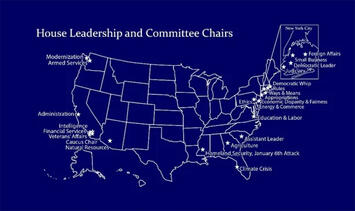
A critical mass of forces finally may be understanding the benefits of what I’ve been advocating for years: that separate political actors in Flyover Country unite to promote our region as a whole, rather than our cities and states always competing with one another for the fruits of economic development and government favor.
The new dynamics are occurring in two key ways in the Upper Midwest, which is as good a place as any to start. We may soon be seeing several of the region’s governors begin to link arms to promote their states collectively to the growing industries behind the manufacturing revitalization of the heartland.
Also, national-level political leadership from here has caught on to fact that Flyover Country has been dealt out of any significant say in the leadership of Democrats in the U.S. House of Representatives. And they want to change that.
As I told Nolan Finley, editorial-page editor of the Detroit News, for a column he posted recently, “There’s a level at which we are dismissed as a region. It’s true in every endeavor. Washington, D.C., controls the government. New York controls finance and marketing. [Hollywood] controls the culture and Silicon Valley controls Big Tech. We’re ringed by power centers.”
So, we must set up one or a handful of new “power centers” of our own, in a fresh strategy to ensure the economic future of Flyover Country. And the best way to do that in the political realm is for governments in our states and municipalities to band together.
Why Now
The need has long been there, but there’s new urgency for two reasons: the economic opportunities available now if we do this right, and the rather sudden recognition that has arisen in people who are in positions to do something about it.
This is not a new idea. The coasts really never have had to break a sweat to promote themselves regionally, given that they’ve controlled all of the power levers in this country. So, when investors as well as immigrants as well as tourists around the world think of America, their minds dart immediately to California or New York City, Washington, D.C., or Seattle, rather than to Pittsburgh or Omaha, Huntsville or Fargo.
But when Amazon was deciding several years ago where to put its “HQ2” — still the most-pursued economic-development prize in America’s history — the region that eventually won the project may have done so in large part because it took a collective approach to wooing the Seattle-based giant. Metro D.C. secured Amazon’s 20,000 new jobs in and around Arlington, Virginia, partly because a Greater Washington Partnership was able to get political ringleaders in the District of Columbia, northern Virginia and southern Maryland to work together to bring it about.
Read the rest of this piece at Flyover Coalition.
Dale Buss is founder and executive director of The Flyover Coalition, a not-for-profit organization aimed at helping revitalize and promote the economy, companies and people of the region between the Appalachians and Rockies, the Gulf Coast and the Great Lakes. He is a long-time author, journalist, and magazine and newspaper editor, and contributor to Chief Executive, Forbes, the Wall Street Journal, the New York Times and many other publications. Buss is a Wisconsin native who lives in Michigan and has also lived in Texas, Pennsylvania and Florida.
Graph: courtesy Flyover Coalition.












